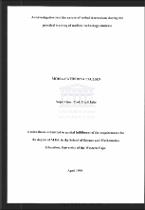| dc.contributor.advisor | Julie, Cyril | |
| dc.contributor.author | Paulsen, Moira Catherina | |
| dc.date.accessioned | 2022-08-31T08:59:52Z | |
| dc.date.available | 2022-08-31T08:59:52Z | |
| dc.date.issued | 1999 | |
| dc.identifier.uri | http://hdl.handle.net/11394/9275 | |
| dc.description | Magister Educationis - MEd | en_US |
| dc.description.abstract | various ideas have been propagated regarding the way people come to know in apprenticeship situations. The particular set of social practice theory that informs this study is that related to old-timers and newcomers. The newcomer comes to know by constant engagement in the activities of the community of experts. This study shows that being around the old-timer does not necessarily gibe rise to learning if the contact between these two agents does not occur as a shared practice. This shared practice will facilitate the curriculum that must exist between them. This curriculum be it a learning curriculum and/or a teaching curriculum can only be successful if the shared practice is transparent to the newcomer, and the newcomer is accepted as a legitimate peripheral participant. The participation of the newcomer in the activities of the old-timer ensures learning to occur. As long as the old-timer prevents the newcomer from engaging in the authentic tasks of medical technology, the newcomer will fail to develop a sense of the 'whole' of the trade and learning will be impaired. The old- timer
provides a bridge between the development of knowledgeable skill and identity, and the production and reproduction of a community of experts. The author's own experience in Medical Technology training and the increasing challengers to empower learners generated questions around the training of medical technology students. It is argued that learners make sense of theoretical ideas by 'doing' that what is learned in the theory. This necessitates the use of the tools of the trade. During this engagement with the tools various phases can be operated in. These phases include the 'way-in' phase and the 'practice phase'. Medical technology practice i.e. the way medical technologist engages in the trade allows for the development of a community of experts. This however also requires the development of certain skills. These skills can be cognitive- and/or practical skills. This study put emphasis on the nature of verbal interactions during the practical training of medical technology students. The study further provides evidence that apprenticeship training of medical technology students takes the form of imitation, i.e. it is unsystematic and unsupported. The emphasis of the training is on service delivery rather than on teaching. There is visible between learning in the formal academic setting (Site A) and learning in the apprenticeship learning situation (Site B). | en_US |
| dc.language.iso | en | en_US |
| dc.publisher | University of the Western Cape | en_US |
| dc.subject | Medical Technology | en_US |
| dc.subject | Foundation for Research Development (FRD) | en_US |
| dc.subject | Department of Microbiology | en_US |
| dc.subject | South African Institution for Medical Research (SAIMR) | en_US |
| dc.subject | Department of chemical Pathology | en_US |
| dc.subject | Red cross children's Hospital | en_US |
| dc.subject | Department of Histology | en_US |
| dc.subject | Department of Cytology and Hematology | en_US |
| dc.subject | Groote Schuur Hospital | en_US |
| dc.subject | Tygerberg Hospital | en_US |
| dc.subject | South Africa | en_US |
| dc.title | An investigation into the nature of verbal interactions during the practical training of medical technology students | en_US |
| dc.rights.holder | University of the Western Cape | en_US |

